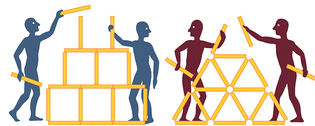 loading
loading
FindingsNoted Gregory NemecView full imageTo function well, an organization should balance cooperation and competition in its workforce. Competition can spur innovation—but it also produces inefficiency: separate teams working toward a goal aren’t as efficient as a single team. A study coauthored by Joyee Deb of the School of Management found that the best outcomes result when a project starts with pure competition to explore options, followed by collaboration. “Do the learning quickly up front, and then invest in one person or idea,” Deb says. “Don’t shift between competition and collaboration.” Research into autism spectrum disorder (ASD) has shown that certain genetic factors and fetal exposure to environmental toxins contribute to ASD risk. Now, by examining the records of nearly 400,000 mother-child and father-child pairs, researchers at Yale’s School of Public Health have found that children of individuals born very pre-term had nearly double the risk of being diagnosed with ASD compared with children whose parents were born at term. The researchers suggest that future studies should track parents born with adverse birth characteristics, to identify other factors that might contribute to ASD in their children.
The comment period has expired.
|
|